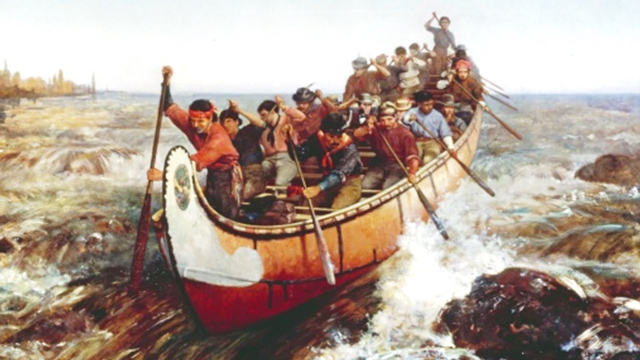
Source: image from the presentation of Carol Leonard.
Under the theme « Comment, vingt ans avant la fameuse expédition de Lewis et Clark, l'océan Pacifique fut atteint par voie de terre… » the conference was in French.
A true passionate of toponymy, Carol Leonard emphasizes that toponymy is at the junction of three sciences: geography, history and linguistics. "Toponymy has two basic functions: to either identify sites or identify the information behind the name a place carries," says someone who tells us he spent countless hours in archives, books and old maps to search French names. "Alberta, Saskatchewan and Manitoba are my playgrounds," he exclaims.
With his research works, Prof Carol Leonard has been able to segment certain historical periods of Western Canadian history: the French regime (1886-1915), Travellers (1886-1929), Metis (1830-1885), Missionaries (1845-1915), Colonisation (1886-1929), Crises interval (1930-1945) and contemporary period (1969-2005). "Between 1886 and 1929, a tidal wave of names appeared and unfortunately these names had no connection with the territory. At that time, we even came to superimpose names to places that already had names and had no link with the territory," he notes.
Professor Leonard has already identified more than 6,000 places' names of French origin. "And I have not yet finished my search in Manitoba and Alberta," says one who believes that there could be up to 10,000 in all of Western Canada.
The epic of Alexander Mackenzie
With this introduction, Carol Leonard has subsequently demonstrated how the French language played a key role in discovery expeditions, especially those led by Alexander Mackenzie, who Carol recalls arrived Montreal in 1778 when he was 14.
In 1779, at age 15, Alexander Mackenzie joins Finlay and Gregory, a position he holds for five years in the Montreal office. From 1785 to 1787, Mackenzie is assigned the English River district, with headquarters in Île-à-la-Crosse (Saskatchewan). In 1787, he associates with Peter Pond in the Athabasca region. In 1788, he succeeds Pond in Athabasca and takes over this department.
That same year, he asks his cousin Roderick to build the first Fort Chipewyan on the south shore of Lake Athabasca. In 1789, on 3 June, he begins the first expedition to the Pacific to return on the 12th of September.
As Carol Leonard explained, even then, there was precedence of the French, and for several reasons: the mainly French lexical corpus of the fur trade, and the skills acquired by Francophones both in terms of geography, navigation and trade with indigenous peoples. Added to these conditions, was the urge of many British to learn French language especially because they cherished the ambition to be entrusted with positions of command and supervision of staff in a Francophone majority setting.
Professor Leonard noted that there was a preponderance of Francophones in different posts and in crews of transport convoys. "At that time, French was the language that mattered, the language that reigned. These people needed to find their way around, so they gave French names to places for landmarks. At that time, the Anglophones had to learn French," recalls Carol Leonard. In short, French for more than one reason was the lingua franca of trade.
Added to this is the fact that in 1793, the expedition members were Alexander Mackay, Joseph Landry, Charles Ducette François Beaulieux, Baptist Bisson, François Courtois and Jacques Beauchamp. "Alexander Mackenzie did not leave traces of a journey he is said to have made in French, but when you look at his surrounding, there is no reason why it would not have been done in a language other than that of Molière," suggests Carol Leonard.
According to Carol, no reason suggests the fact that Alexander Mackenzie had changed the customs and the language used, but he obviously did. Because of the difficulties and dangers during expeditions, he made sure he maintained the most conducive and most familiar conditions, which were essential to the success of his expeditions and to his reaching of the Pacific Ocean.